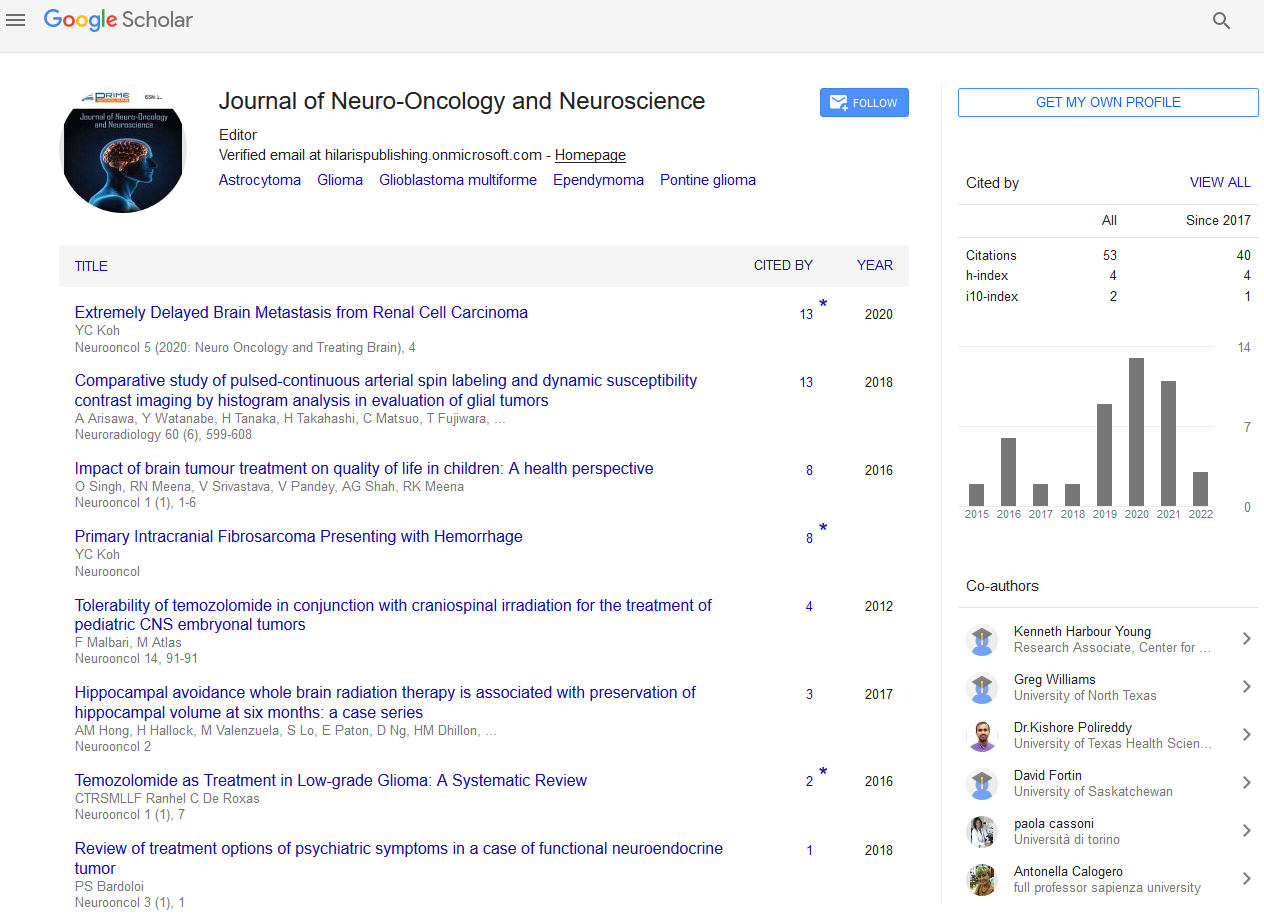Commentary - (2024) Volume 9, Issue 2
Cognitive Impairment and Rehabilitation in Brain Tumor Patients
Evangeline Rose*
Department of Sciences, University of Oxford, United Kingdom
*Correspondence:
Evangeline Rose,
Department of Sciences, University of Oxford,
United Kingdom,
Email:
Received: 29-May-2024, Manuscript No. IPJNO-24-20750 ;
Editor assigned: 31-May-2024, Pre QC No. IPJNO-24-20750 (PQ);
Reviewed: 14-Jun-2024, QC No. IPJNO-24-20750 ;
Revised: 19-Jun-2024, Manuscript No. IPJNO-24-20750 (R);
Published:
26-Jun-2024, DOI: 10.21767/2572-0376.9.2.16
Introduction
Cognitive impairment is a common and debilitating
consequence of brain tumors and their treatments, significantly
affecting patients’ quality of life. The complexity of cognitive
deficits in brain tumor patients necessitates a comprehensive
approach to rehabilitation, aiming to restore cognitive function
and improve daily living. This article explores the nature of
cognitive impairment in brain tumor patients, the underlying
causes, and the current strategies for cognitive rehabilitation.
Cognitive impairment in brain tumor patients can manifest
in various domains, including memory, attention, executive
function, language, and visuospatial abilities. These deficits can
result from the tumor itself, surgical resection, chemotherapy,
radiation therapy, or a combination of these factors. The
location and size of the tumor play a crucial role in determining
the type and severity of cognitive impairment. While surgical
resection is often necessary to remove the tumor, it can cause
damage to adjacent healthy brain tissue, leading to cognitive
deficits. The extent of cognitive impairment is related to the
size and location of the resected area.
Description
Radiation therapy can cause both acute and long-term cognitive
side effects. Acute effects may include fatigue and temporary
cognitive dysfunction, while chronic effects can lead to
progressive cognitive decline due to radiation-induced damage
to healthy brain cells. Chemotherapy drugs can cross the bloodbrain
barrier and affect cognitive function. This phenomenon,
often referred to as “chemobrain,” includes symptoms like
memory lapses, difficulty concentrating, and slower processing
speeds. Depression, anxiety, and stress, commonly associated
with a cancer diagnosis, can exacerbate cognitive impairment.
These psychological factors need to be addressed as part of a
holistic rehabilitation approach. A thorough neuropsychological
evaluation is crucial for identifying specific cognitive deficits
and tailoring rehabilitation programs accordingly. These
assessments provide a baseline for measuring progress and
adjusting interventions. Cognitive training programs involve
structured tasks designed to improve specific cognitive
functions such as memory, attention, and executive function.
These programs can be computer-based or therapist-led
and are often personalized to address individual deficits.
Certain medications, such as stimulants and cholinesterase
inhibitors, have shown promise in mitigating cognitive deficits
in brain tumor patients. Occupational therapy, speech therapy,
and physical therapy are integral components of cognitive
rehabilitation. Occupational therapists help patients develop
strategies for daily living activities, while speech therapists
address language and communication deficits. Addressing
psychological factors such as depression and anxiety is critical
for cognitive rehabilitation. Counseling, cognitive-behavioral
therapy and support groups can provide emotional support
and improve overall well-being, which in turn can enhance
cognitive function.
Conclusion
Cognitive impairment in brain tumor patients is a multifaceted
issue that requires a comprehensive and individualized approach
to rehabilitation. Through a combination of neuropsychological
assessment, cognitive training, pharmacological interventions,
rehabilitation therapies, psychological support, assistive
technologies, lifestyle modifications, and caregiver involvement,
significant improvements in cognitive function and quality of
life can be achieved. Ongoing research and advancements in
neuro-oncology and rehabilitation techniques hold promise
for further enhancing the care and outcomes for brain tumor
patients facing cognitive challenges.
Acknowledgement
None.
Conflict Of Interest
The author declares there is no conflict of interest in publishing
this article.
Citation: Rose E (2024) Cognitive Impairment and Rehabilitation in Brain Tumor Patients. Neurooncol. 9:16.
Copyright: © 2024 Rose E. This is an open-access article distributed under the terms of the Creative Commons Attribution License, which permits unrestricted use, distribution, and reproduction in any medium, provided the original author and source are credited.

